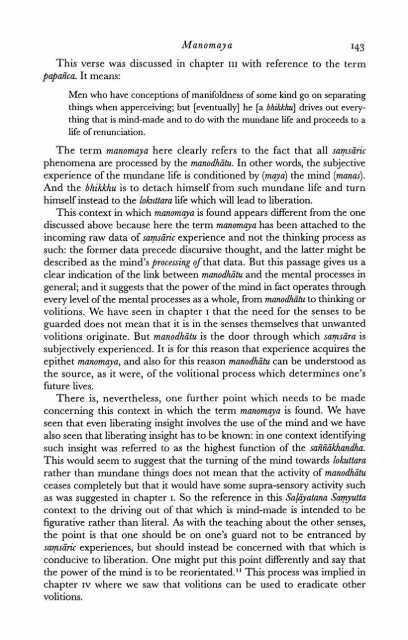Identity and Experience_Hamilton_1996
Identity and Experience_Hamilton_1996
Identity and Experience_Hamilton_1996
Create successful ePaper yourself
Turn your PDF publications into a flip-book with our unique Google optimized e-Paper software.
Manomaya<br />
This verse was discussed in chapter 111 with reference to the term<br />
PaparZca. It means:<br />
Men who have conceptions of manifoldness of some kind go on separating<br />
things when apperceiving; but [eventually] he [a bhikkhu] drives out everything<br />
that is mind-made <strong>and</strong> to do with the mundane life <strong>and</strong> proceeds to a<br />
life of renunciation.<br />
The term manomaya here clearly refers to the fact that all samsiric<br />
phenomena are processed by the manodhitu. In other words, the subjective<br />
experience of the mundane life is conditioned by (maya) the mind (manas).<br />
And the bhikkhu is to detach himself from such mundane life <strong>and</strong> turn<br />
himself instead to the lokzlttara life which will lead to liberation.<br />
This context in which manomaya is found appears different from the one<br />
discussed above because here the term manomaya has been attached to the<br />
incoming raw data of samsiric experience <strong>and</strong> not the thinking process as<br />
such: the former data precede discursive thought, <strong>and</strong> the latter might be<br />
described as the mind's processing of that data. But this passage gives us a<br />
clear indication of the link between manodhitu <strong>and</strong> the mental processes in<br />
general; <strong>and</strong> it suggests that the power of the mind in fact operates through<br />
every level of the mental processes as a whole, from manodhh to thinking or<br />
volitions. We have seen in chapter I that the need for the senses to be<br />
guarded does not mean that it is in the senses themselves that unwanted<br />
volitions originate. But manodhitu is the door through which samstira is<br />
subjectively experienced. It is for this reason that experience acquires the<br />
epithet manomaya, <strong>and</strong> also for this reason manodhitu can be understood as<br />
the source, as it were, of the volitional process which determines one's<br />
future lives.<br />
There is, nevertheless, one further point which needs to be made<br />
concerning this context in which the term manomaya is found. We have<br />
seen that even liberating insight involves the use of the mind <strong>and</strong> we have<br />
also seen that liberating insight has to be known: in one context identifying<br />
such insight was referred to as the highest function of the safiiiikh<strong>and</strong>ha.<br />
This would seem to suggest that the turning of the mind towards lokuttara<br />
rather than mundane things does not mean that the activity of manodhitu<br />
ceases completely but that it would have some supra-sensory activity such<br />
as was suggested in chapter I. So the reference in this SaFyatana Samyutta<br />
context to the driving out of that which is mind-made is intended to be<br />
figurative rather than literal. As with the teaching about the other senses,<br />
the point is that one should be on one's guard not to be entranced by<br />
samsiric experiences, but should instead be concerned with that which is<br />
conducive to liberation. One might put this point differently <strong>and</strong> say that<br />
the power of the mind is to be reorientated." This process was implied in<br />
chapter IV where we saw that volitions can be used to eradicate other<br />
volitions.<br />
I43


